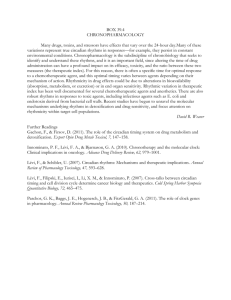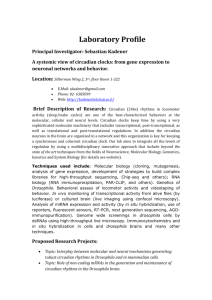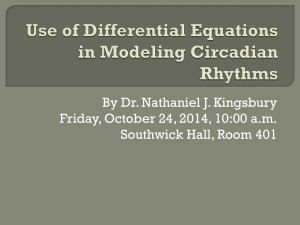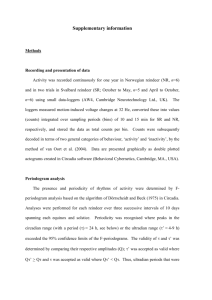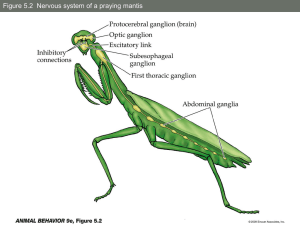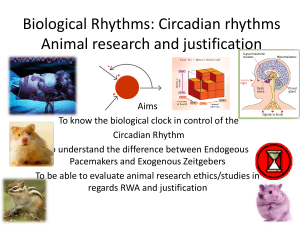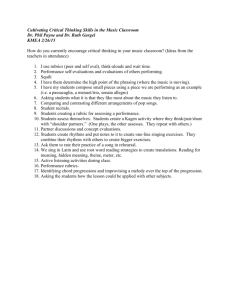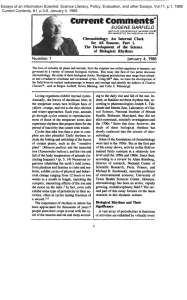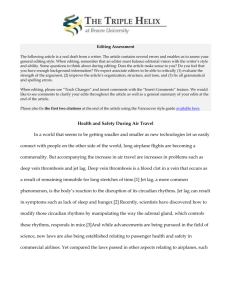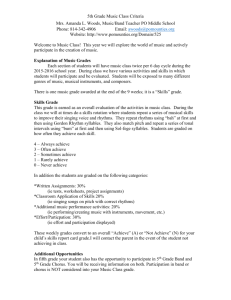Trainee Professional Development Day Session Information
advertisement
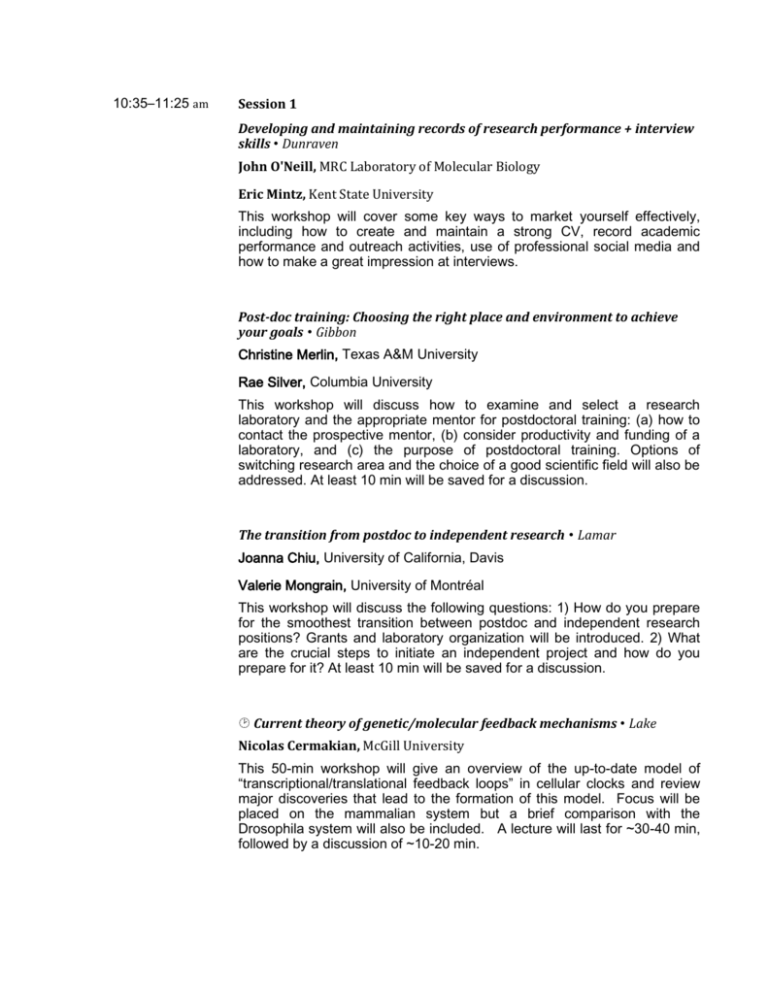
10:35–11:25 am Session 1 Developing and maintaining records of research performance + interview skills • Dunraven John O'Neill, MRC Laboratory of Molecular Biology Eric Mintz, Kent State University This workshop will cover some key ways to market yourself effectively, including how to create and maintain a strong CV, record academic performance and outreach activities, use of professional social media and how to make a great impression at interviews. Post-doc training: Choosing the right place and environment to achieve your goals • Gibbon Christine Merlin, Texas A&M University Rae Silver, Columbia University This workshop will discuss how to examine and select a research laboratory and the appropriate mentor for postdoctoral training: (a) how to contact the prospective mentor, (b) consider productivity and funding of a laboratory, and (c) the purpose of postdoctoral training. Options of switching research area and the choice of a good scientific field will also be addressed. At least 10 min will be saved for a discussion. The transition from postdoc to independent research • Lamar Joanna Chiu, University of California, Davis Valerie Mongrain, University of Montréal This workshop will discuss the following questions: 1) How do you prepare for the smoothest transition between postdoc and independent research positions? Grants and laboratory organization will be introduced. 2) What are the crucial steps to initiate an independent project and how do you prepare for it? At least 10 min will be saved for a discussion. Current theory of genetic/molecular feedback mechanisms • Lake Nicolas Cermakian, McGill University This 50-min workshop will give an overview of the up-to-date model of “transcriptional/translational feedback loops” in cellular clocks and review major discoveries that lead to the formation of this model. Focus will be placed on the mammalian system but a brief comparison with the Drosophila system will also be included. A lecture will last for ~30-40 min, followed by a discussion of ~10-20 min. Basics of chronobiology • Canyon Mike Menaker, University of Virginia Confused about CTs and ZTs? Unsure of the difference between Ts and s? In this workshop we will explore and discuss some of the fundamental principles of chronobiology, including entrainment, temperature compensation, masking, and free-running rhythms. A great place to start if you’re new to the field. 11:45–12:35 pm Session 2 How to get the best out of your supervisor and mentors? • Dunraven Christopher Colwell, University of California, Los Angeles Diane Boivin, McGill University A good relationship with those around you is crucial to maintain a productive working environment. This workshop will cover the importance of good mentoring, help you identify responsibilities of both mentors and trainees, and discuss how to deal with problems in the mentor-trainee relationship from both angles. Grantsmanship: Do's and Don’ts in grant writing • Gibbon Doug McMahon, Vanderbilt University Learn the ropes of how to write a competitive grant. Special attention will be paid to the specific aims page, presentation of rationale, results, and alternative interpretations, and development of a training timeline. Imaging of luminescent and fluorescent reporter models • Lamar David Welsh, University of California, San Diego This workshop will introduce experimental methods and theory of imaging of luminescence and fluorescent reporter models. Circadian research often takes advantage of imaging techniques to monitor circadian rhythms over many cycles. The microscope settings, cameras, and reagents will be presented. How such technology can be applied to the field of chronobiology will also be described. At least 10 min will be saved for a discussion and questions. Statistical Methods for Time Series Analysis of Rhythms • Lake John Hogenesch, University of Pennsylvania Ken Wright, University of Colorado Analyses of time-series data sets, as frequently required in chronobiological research, can be a daunting task. This workshop will cover various methods that can be used to detect and analyze periodic patterns in biological time-series data (e.g. rhythmicity, period, amplitude, phase, phase shifts), sketch their strengths and limitations as well as provide an overview of available software useful for such analyses. Entrainment of the circadian clock • Canyon Ralph Mistlberger, Simon Fraser University This 50-min workshop will introduce the basic concepts and theories of entrainment of the circadian clock as well as the methodology that are commonly used to study entrainment in rodents and flies. It will mainly include two parts: photic entrainment and food entrainment. Focus will be placed on the general principles rather than detailed techniques. A lecture will last for ~30-40 min, followed by a discussion of ~10-20 min. 12:40–1:40 pm Lunch • Magnolia B & C 1:45–2:40 pm “Positive feedback looping” • Jefferson This activity will consist of random one-on-one blitz discussions. Participants are asked to pair randomly and discuss for 7 minutes, after which they are asked to pair with another participant, and so on, for ~50 min. The aim of this activity is to stimulate interaction and exchanges, to allow participants to meet new people, and to "break the ice" before the SRBR conference starts. 3:00–3:50 pm Session 3 Work in the Industry and Other Non-Academic Settings as an Alternative Career • Dunraven Michael Sesma, NIH, National Institute of General Medical Sciences Chris Steele, Program Officer at U.S. Office of Naval Research This workshop will give on overview of working in the industry following completion of your graduate/postdoc work, and a comparison of research in an industry situation vs. an academic situation. In addition, insights into the work in a non-profit research institute will be provided in contrast to the industry and academia background. At least 10 min will be saved for a discussion. Current theory of genetic/molecular feedback mechanisms • Lake Nicolas Cermakian, McGill University This 50-min workshop will give an overview of the up-to-date model of “transcriptional/translational feedback loops” in cellular clocks and review major discoveries that lead to the formation of this model. Focus will be placed on the mammalian system but a brief comparison with the Drosophila system will also be included. A lecture will last for ~30-40 min, followed by a discussion of ~10-20 min. Asking the Right Questions & Designing the Right Experiments in a Biological Rhythms Project • Gibbon Till Roenneberg, Ludwig-Maximilians University This workshop will focus on optimizing experimental design to fit a hypothesis pertinent to rhythms research. Discussion on selecting the most appropriate controls, lighting conditions (light-dark cycle vs. skeleton photoperiod vs constant conditions), the number of time points, and the means of measurement (behavioral vs physiological vs molecular) will take place. Circadian physiological and behavioral methods in flies • Lamar Amita Sehgal, University of Pennsylvania This 50-min workshop will introduce experimental methods for monitoring circadian rhythms in Drosophila melanogaster. Commonly used physiological and behavioral parameters will be reviewed and experimental protocols will be discussed. A lecture will last for ~30-40 min, followed by questions and discussion. Circadian Physiological and Behavioral Methods in Rodents • Canyon Urs Albrecht, University of Fribourg This workshop will describe experimental setups for the monitoring of circadian physiology in rodent models (mouse, rat, hamster, and diurnal rodents). Basic physiological and behavioral parameters and underlying protocols will be presented and discussed. At least 10 min will be saved for a discussion. 4:10–5:00 pm Session 4 Making effective scientific presentations • Dunraven Martha Gillette, University of Illinois, Urbana Presenting scientific data well can be difficult and daunting, but this workshop will cover some key points to consider in order to improve your skills. From planning the content and structure to the delivery itself, including use of technology, humour & anecdotes, how to adapt to your audience and coping with difficult questions, this workshop should leave you more confident in your ability to present your data effectively. Statistical Methods for Time Series Analysis of Rhythms • Lake John Hogenesch, University of Pennsylvania Ken Wright, University of Colorado Analyses of time-series data sets, as frequently required in chronobiological research, can be a daunting task. This workshop will cover various methods that can be used to detect and analyze periodic patterns in biological time-series data (e.g. rhythmicity, period, amplitude, phase, phase shifts), sketch their strengths and limitations as well as provide an overview of available software useful for such analyses. Imaging of luminescent and fluorescent reporter models • Lamar David Welsh, University of California, San Diego This workshop will introduce experimental methods and theory of imaging of luminescence and fluorescent reporter models. Circadian research often takes advantage of imaging techniques to monitor circadian rhythms over many cycles. The microscope settings, cameras, and reagents will be presented. How such technology can be applied to the field of chronobiology will also be described. At least 10 min will be saved for a discussion and questions. Basic Methodology to Study Human Circadian Rhythms • Gibbon Debra Skene, University of Surrey The field of human chronobiology is continually growing. This workshop is geared toward those new to or not familiar with human chronobiology studies, and will provide an overview of the experimental paradigms and techniques currently used to investigate circadian rhythms in humans. Translational Chronobiology • Canyon Steven Brown, University of Zurich Phyllis Zee, Northwestern University How, where and when does basic chronobiological research translate to the clinic and everyday life? This workshop will strive to provide an overview as well as several in-depth examples of current applications of chronobiology in human well-being and disease. 5:00 pm Conclusion of Trainee Professional Development Day (Trainee Committee members wrap-up in each workshop) Indicates workshops delivered
